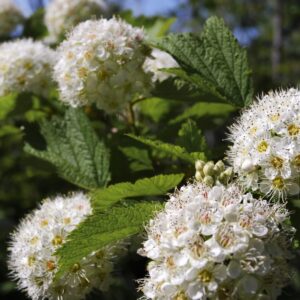Showing the single result
Wholesale Ninebark Shrubs in Michigan
If you are looking to purchase Ninebark shrubs in the United States, Cold Stream Farm is a wholesale and retail seller based in our home of Free Soil, Michigan. We are available for Ninebark demands of large and small quantities, with no minimum order size required.
Cold Stream Farm sells Ninebark (Physocarpus opulifolius) in both bare root seedlings and transplants of various sizes. Supplies may be limited, so feel free to order online or contact us today about current and future Ninebark availability.
About Ninebark (Physocarpus opulifolius)
Physocarpus opulifolius is a flowering plant that is typically referred to as “Common Ninebark,” “Atlantic Ninebark,” “Eastern Ninebark,” or simply “Ninebark.” It is a part of the Rosaceae family and is most often found in the wild near streams and on rocky hillsides.
Native throughout eastern North America, Ninebark shrubs are hearty year-round plants that provide valuable food for animals in all seasons. The plant gets its nickname from its large variety of bark colors that can be seen peeling from the tree at various stages throughout its lifetime.
Ideal Growing Conditions
Ninebark is very drought-resistant, and the plants tend to be quite dense, fast-growing, and highly adaptive. Able to thrive in almost all environments, it is possible to grow Ninebark in moist, dry, acidic, gravely, or alkaline soil. Heavy clay conditions are also typically suitable for a Ninebark tree to live a healthy life.
In terms of sunlight, Ninebark shrubs prefer partial shade and full sun conditions in cooler climates. The plant can be easily grown in USDA Zones 2-7 but may require at least some shade in areas with regularly hot temperatures.
Physocarpus opulifolius do not require regular watering, and well-drained systems are ideal for the overall performance of the plant. Ninebark shrubs perform best for dry or arid climates and may struggle in overly humid areas.
Size and Appearance
Mature Ninebark plants can grow to be 6 to 9 feet tall with significant branches reaching out to take up a considerable amount of space. The flowers of a Ninebark plant are white or pink, and the fruit ripens to be both small and red.
Throughout the course of the year, the dense green leaves of a Ninebark plant will become increasingly vibrant shades of green. In the fall, the leaves will turn yellow before ultimately being lost in the winter.
Common Ninebark Calendar
Ninebark is a four-season shrub. The flowers of a Ninebark plant are white and pink, blooming in the early summer. By the fall, the plant’s fruit will ripen, and its leaves will change to more vibrant colors. Here, healthy plant owners can expect flowers in May and June and fruits in August and October.
In the winter, the bark of a Ninebark shrub begins to exfoliate, peeling off into strips of various shades of brown. As quite a few different tones are exposed, it becomes very obvious as to where “nine” bark gets its name.
Why Choose Ninebark?
A Ninebarks’ ruggedness makes it perfect for a wide variety of applications, and typical shrubs can withstand harsh winter conditions. In the wild, Ninebark shrubs are most commonly found on riverbanks, and their dense roots are great for combating erosion.
As a thick plant, Ninebark is also often used as a border to deter unwanted guests and wildlife. Despite bearing fruit, Ninebark trees are not very palatable for most creatures and are able to withstand heavy browsing from deer, elk, and other animals.
Common Uses for Ninebark Shrub Parts
The Ninebark plant has been used in many different capacities throughout history. Medicinally, the bark has been used in teas and other forms as a laxative or treatment for neck sores. It has even been found to help in the treatment of gonorrhea.
As a structurally sound plant, Ninebark is often used in bioengineering. The fibrous roots help stabilize the shores of lakes and rivers while providing coverage for local wildlife. Native Americans have also used Ninebark shrubs to create small wooden items such as bows and sewing instruments.
Today, Ninebark plants are most commonly used to create natural borders on properties alongside other dense foliage such as spirea and lilac plants. Shrubs can be initially pruned to shape or grown with free range.
Challenges to Consider
Ninebark shrubs are generally unchallenging to grow, only requiring light annual fertilization in the spring. Diseases and pests generally may create problems, most commonly associated with mildew or aphids. Overall, Ninebark plants will typically take care of themselves.
For best results, it is recommended to give Ninebark shrubs attention in the spring by removing deadheads and pruning back damaged or overgrown branches.
Purchase Ninebark Shrubs Today
Cold Stream Farm carries Ninebark shrubs at all stages in life from seedlings to full-size transplants. We have no minimum order requirement and work to provide affordable retail and wholesale pricing. Get started with your Ninebark order today.

